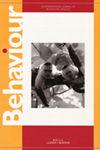Shifting incubation rhythms in response to predation risk and the length of the response in mountain bluebirds
IF 1
4区 生物学
Q4 BEHAVIORAL SCIENCES
引用次数: 0
Abstract
Abstract Parent birds may alter incubation rhythms in response to predation risk but few studies have examined the recovery time immediately after exposure to a predator. Here, we examined incubation rhythms in mountain bluebirds ( Sialia currucoides ) in response to a simulated nest predator, a taxidermy-mounted squirrel. We used data loggers (iButtons) to measure the recess (off-bout) length, recess rate, and constancy of incubation and found no relationship between incubation rhythms and female age, body size and aggressiveness. Incubating females reacted to the predator by reducing nest visitation rates and increasing recess length but did not change incubation constancy. Instead, constancy was negatively associated with ambient temperature. Changes in incubation behaviour lasted about 48 h before returning to pre-exposure patterns. Our results suggest that modifying incubation rhythms is costly for female birds and the demand to regulate egg temperature efficiently limits the length of behavioural responses to the threat of nest predation.改变孵化节奏以应对捕食风险和山地蓝鸟的反应时间
父母鸟可能会改变孵化节律以应对捕食者的风险,但很少有研究调查暴露于捕食者后立即恢复的时间。在这里,我们研究了山蓝鸟(Sialia currucoides)对模拟的巢穴捕食者——松鼠的反应的孵化节奏。我们使用数据记录仪(iButtons)测量间歇(非间歇)长度、间歇率和孵育的持续性,发现孵育节律与女性年龄、体型和攻击性没有关系。孵化中的雌蜂对捕食者的反应是减少巢访率和增加休息时间,但不改变孵化的稳定性。相反,恒常性与环境温度呈负相关。孵育行为的变化持续了大约48小时,然后恢复到暴露前的模式。我们的研究结果表明,改变孵化节奏对雌鸟来说是昂贵的,有效调节卵温的需求限制了对巢穴捕食威胁的行为反应的长度。
本文章由计算机程序翻译,如有差异,请以英文原文为准。
求助全文
约1分钟内获得全文
求助全文
来源期刊

Behaviour
生物-动物学
CiteScore
1.80
自引率
7.70%
发文量
44
审稿时长
3 months
期刊介绍:
Behaviour is interested in all aspects of animal (including human) behaviour, from ecology and physiology to learning, cognition, and neuroscience. Evolutionary approaches, which concern themselves with the advantages of behaviour or capacities for the organism and its reproduction, receive much attention both at a theoretical level and as it relates to specific behavior.
 求助内容:
求助内容: 应助结果提醒方式:
应助结果提醒方式:


